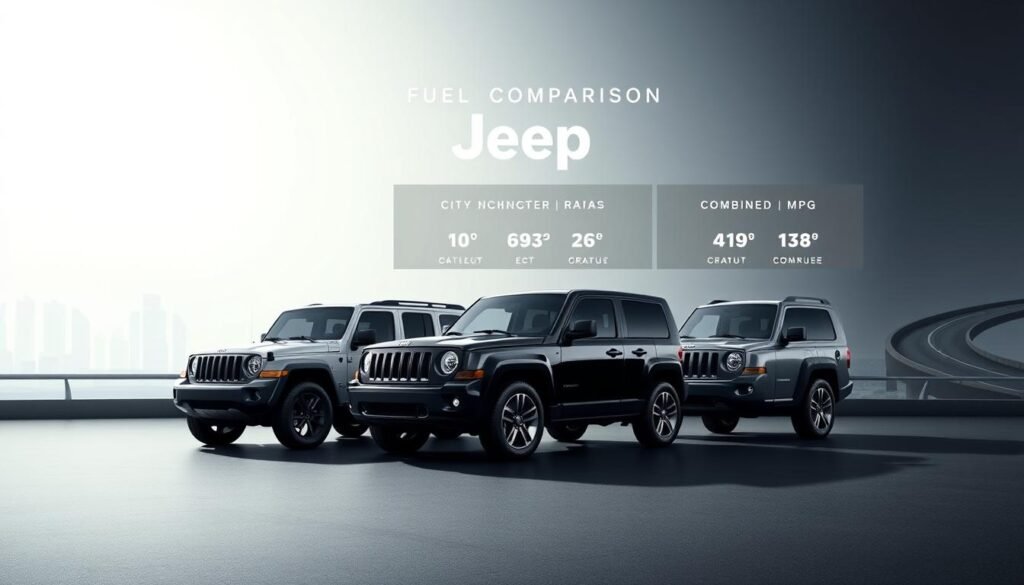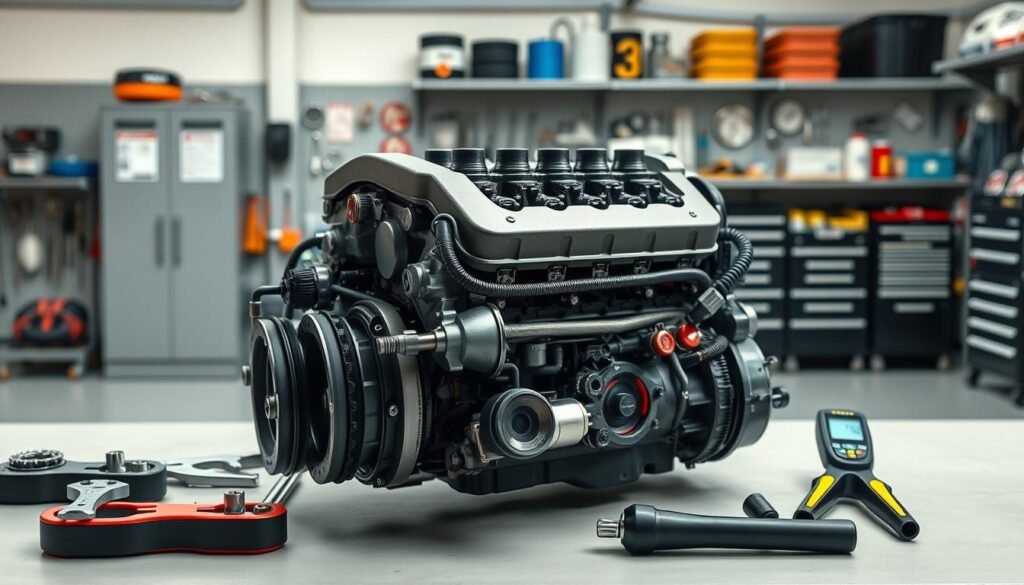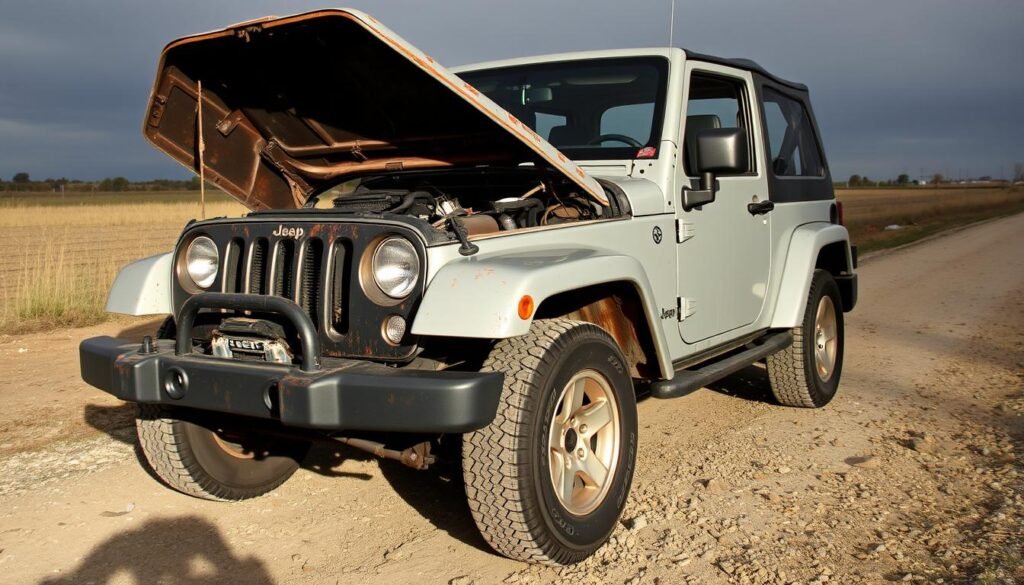Did you know the Jeep 2.0 Turbo Engine has 270 horsepower? It also offers great fuel efficiency. This engine has changed how drivers enjoy power and performance on off-road adventures.
The Jeep 2.0 Turbo Engine is a big step forward in car engineering. It combines strong power with advanced technology. It’s made for today’s drivers, giving 295 lb-ft of torque. This makes it great for both city driving and rough trails.
This engine comes with an 8-speed automatic transmission. It’s part of the Jeep Wrangler’s engine options. It’s perfect for city streets or tough trails, balancing power and efficiency.
Drivers who love performance and those who need practicality will love this engine. It gets 20 mpg in the city and 22 mpg on the highway. This shows modern engines can be exciting and useful at the same time.
Overview of the Jeep 2.0 Turbo Engine
The Jeep 2.0L Turbo engine is a top-notch example of modern Jeep technology. It offers a great mix of power and efficiency. This engine has changed how people drive Jeep’s legendary vehicles.
Engine Architecture and Design
The 2.0L Turbo engine is a result of Jeep’s focus on advanced design. It has:
- Turbocharged 4-cylinder configuration
- Compact yet powerful 2.0-liter displacement
- Advanced direct injection technology
- Lightweight aluminum block construction
Development History
Jeep’s team created this engine to meet today’s SUV needs. The 2.0L Turbo engine specs show a smart balance between power and fuel efficiency.
| Engine Specification | Performance Details |
|---|---|
| Horsepower | 270 hp @ 5,250 RPM |
| Torque | 295 lb-ft @ 3,000 RPM |
| Transmission | 8-speed automatic |
Integration Across Jeep Models
The 2.0L Turbo engine is used in many Jeep models, showing its flexibility. Wrangler Sahara is a great example of this engine’s power and efficiency.
- Available in Jeep Wrangler Sahara
- Optional in select Jeep SUV lineups
- Provides superior fuel economy compared to traditional V6 engines
Performance Specifications and Capabilities
The Jeep 2.0 Turbo engine is a real powerhouse. It brings impressive performance to the SUV world. With 270 horsepower and 295 lb-ft of torque, it makes driving exciting on any terrain.
Key performance highlights of the Jeep 2.0 Turbo include:
- Exceptional power output of 270 horsepower
- Robust torque delivery at 295 lb-ft
- Optimized for both city driving and off-road adventures
- Advanced turbocharging technology
The engine’s remarkable capabilities are clear. It handles city streets and off-road trails with ease. Its advanced tech ensures quick acceleration and smooth power.
Jeep fans will love how it balances power and efficiency. The 2.0 Turbo offers a thrilling drive. It’s perfect for both off-road adventures and highway trips, always delivering great performance.
The Jeep 2.0 Turbo represents the pinnacle of modern turbocharged engine design, showing unmatched performance and reliability.
Power Output and Torque Delivery
The Jeep 2.0 turbo engine is a big step up in turbocharged SUV engines. It offers strong performance, rivaling V6 engines. This engine shows Jeep’s focus on power, efficiency, and driving feel.
Horsepower Ratings Breakdown
The 2.0-liter turbocharged inline-4 engine has 270 horsepower at 5,250 RPM. Compared to the 3.6-liter Pentastar V6, it has a similar power level but with some differences:
- Horsepower: 270 hp at 5,250 RPM
- Peak power slightly lower than V6 (-15 horsepower)
- Electronically limited maximum engine speed of 5,800 RPM
Torque Characteristics
The 2.0-liter turbo engine really stands out in torque. It makes 295 lb-ft of torque at 3,000 RPM. This gives it a big edge in low-end power.
| Engine Type | Horsepower | Torque | 0-60 mph Time |
|---|---|---|---|
| 3.6L Pentastar V6 | 285 hp | 260 lb-ft | 6.1-7.5 seconds |
| 2.0L Turbo I-4 | 270 hp | 295 lb-ft | 6.5-7.5 seconds |
Performance Comparison with V6 Options
The 2.0-liter turbocharged engine has clear benefits in Jeep engine comparison. It may have less peak horsepower but has +35 lb-ft of torque. This means better acceleration and pulling power at low speeds.
Drivers can expect acceleration times between 6.5 to 7.5 seconds. This is competitive with V6 engines and might also mean better fuel efficiency.
Fuel Efficiency and Economy Benefits

The Jeep 2.0L Turbo engine is a big step forward in fuel-efficient SUVs. It offers great performance and saves on fuel. Drivers will see a remarkable fuel efficiency that’s top in the SUV market.
Here are the main fuel economy benefits of the 2.0L Turbo engine:
- EPA-estimated 20 city / 21 highway MPG
- Annual fuel cost around $2,575
- Combined fuel consumption of 10.3 L/100 km
Comparative Performance: The 2.0L Turbo engine beats other Jeep engines in efficiency. It makes 270 horsepower and uses less fuel than the standard 3.6L V6. The 3.6L V6 gets 17 city / 23 highway MPG.
Advanced tech helps the engine’s great fuel economy. Direct injection and smart engine management systems are key. These features let drivers enjoy strong performance without losing fuel efficiency in their SUVs.
Turbocharger System Components
The Jeep 2.0 Turbo Engine is a top example of modern turbocharger tech. It uses advanced Jeep engine parts for great performance. This shows the amazing engineering in today’s cars.
Turbocharger systems have many key parts that work together well. Jeep engineers have carefully made these parts to improve engine performance in all driving situations.
Boost Pressure Management
Managing boost pressure is key for the engine to run well. The system uses advanced sensors and electronic controls to adjust air compression just right. Important parts include:
- Digital pressure monitoring
- Real-time adjustment mechanisms
- Adaptive performance algorithms
Intercooler Design
The intercooler is important for cooling air. Precision-engineered cooling systems keep compressed air cool. This helps the engine run better and more efficiently.
| Component | Price Range | Percentage of Total Components |
|---|---|---|
| Turbocharger Components Under $100 | $1.25 – $99.99 | 57% |
| Mid-Range Components | $100 – $500 | 32% |
| Premium Components | $500 – $1,530 | 11% |
Wastegate Operation
The wastegate is a key part that helps control pressure. It keeps the turbocharger from getting too much pressure. This protects the turbocharger and keeps the engine running at its best.
Precision engineering transforms raw power into controlled performance.
Jeep’s use of advanced turbocharger tech makes a powerful engine. It balances power, efficiency, and reliability. This is great for drivers who want the best from their car.
Common Maintenance Requirements

Keeping your 2.0 Turbo Jeep engine in top shape is key. Regular care helps it last longer and run better. This ensures it keeps its impressive performance.
Here are the main things you need to do:
- Change the oil every 7,500 miles with the right premium fuel
- Use almost 5 quarts of top-quality oil for each service
- Check the spark plugs often
- Do full system checks to catch problems early
Here are the important times for maintenance:
| Maintenance Task | Recommended Interval |
|---|---|
| Oil Change | Every 7,500 miles |
| Tire Rotation | Every 7,500 miles |
| Brake Inspection | Every 20,000 miles |
| Transfer Case Fluid Change | Every 60,000 miles |
By being proactive, your Jeep 2.0 Turbo engine could last up to 250,000 miles with the right care. Keeping up with maintenance is essential for its performance.
“Regular maintenance is the key to preserving your engine’s power and efficiency” – Jeep Maintenance Experts
While maintenance might cost more than other engines, it’s worth it. It saves you from expensive repairs and keeps your Jeep running great. Don’t forget to check the cooling system, transmission fluid, and do regular inspections to keep your Jeep in top condition.
Reliability Issues and Solutions
Understanding the Jeep engine reliability of the 2.0 Turbo is key. This engine offers great performance but may face issues over time. Owners should know about these problems.
The Jeep 2.0 Turbo engine is well-made but can face specific challenges. These need early attention and care.
Coolant System Concerns
Early Jeep 2.0 Turbo models had coolant system problems. These include:
- Potential coolant leaks
- Potential thermostat malfunctions
- Potential radiator performance degradation
Turbocharger Longevity
The turbocharger’s performance is vital for the 2.0 Turbo’s reliability. Its lifespan depends on:
- Regular oil changes
- Proper cooling system maintenance
- Avoiding aggressive driving patterns
Prevention Measures
Strategic maintenance boosts Jeep engine reliability:
| Maintenance Action | Recommended Frequency |
|---|---|
| Oil Changes | Every 5,000 miles |
| Coolant System Inspection | Annually |
| Turbocharger Diagnostic Check | Every 30,000 miles |
Proactive care can help prevent 2.0 Turbo problems and extend the engine’s life.
Towing Capacity and Capabilities

The Jeep 2.0 Turbo engine offers great towing power for adventurous drivers. It can tow up to 5,000 pounds, making it perfect for various towing tasks.
Several important factors affect the 2.0 Turbo’s towing performance:
- Maximum towing capacity of 5,000 pounds for four-door Rubicon models
- Torque output of 295 pound-feet enhances pulling power
- Specific configurations required for optimal towing performance
The towing capacity varies by Jeep model and setup. For example, four-door Rubicon models can tow 5,000 pounds with an automatic transmission. Other four-door models can tow up to 3,500 pounds. Two-door models can tow up to 2,000 pounds.
Critical towing considerations include:
- Transmission type (automatic vs. manual)
- Specific trim level
- Vehicle configuration
- Proper towing package installation
The 2.0 Turbo engine shows that small turbocharged engines can handle big towing jobs well.
Jeep owners should check their vehicle’s manual for towing limits and needed equipment. This ensures safe towing.
Engine Management System Features
The Jeep engine technology is a smart way to manage performance in the 2.0 Turbo engine. It’s the brain of the powertrain, making sure it works well in all driving situations.
Key features of the 2.0 Turbo performance management system include:
- Adaptive Learning Technology: Dynamically adjusts engine parameters based on driving style
- High-Pressure Common-Rail Injection: Operates at 2,900 psi for superior fuel atomization
- Integrated Electronic Control Unit (ECU): Optimizes fuel delivery and boost pressure
- Real-Time Performance Monitoring: Tracks engine performance metrics continuously
The engine management system works well with other important vehicle systems. Its smart design ensures optimal power delivery while maintaining exceptional fuel efficiency.
Advanced sensors throughout the system check many things like:
- Ambient temperature
- Throttle position
- Engine load
- Combustion efficiency
Thanks to smart algorithms, the Jeep 2.0 Turbo engine management system gives drivers a great experience. It’s responsive, efficient, and powerful, adapting to how each driver likes to drive.
Comparison with Competitor Engines
The Jeep 2.0 Turbo Engine shines in the SUV engine comparison. It boasts 270 horsepower and 295 pound-feet of torque. This puts it in a strong spot against the Ford Bronco’s 2.3-liter turbo and the Toyota 4Runner’s V6.
The Ford Bronco’s engine has 300 horsepower and 325 pound-feet of torque. This gives it a slight edge over the Jeep. The Toyota 4Runner’s 4.0-liter V6 makes 270 horsepower and 278 pound-feet of torque. This shows the Jeep is a strong contender in the mid-size SUV market.
Looking at fuel efficiency and versatility, the Jeep 2.0 Turbo Engine leads. It gets 20 mpg city and 25 mpg highway. This beats the Toyota 4Runner’s 16 mpg city and 19 mpg highway. Its efficiency and strong performance make it a great choice for those wanting a balanced SUV.
In the end, the Jeep 2.0 Turbo Engine is a smart mix of power, efficiency, and reliability. Its strong performance and Jeep’s trusted engineering make it a top pick for SUV fans looking for a versatile engine.
FAQ
What vehicles in the Jeep lineup feature the 2.0 Turbo Engine?
The 2.0 Turbo Engine is found in popular Jeep models. These include the Wrangler, Cherokee, and Gladiator. It offers a powerful and efficient engine option for different vehicle types.
How much horsepower does the Jeep 2.0 Turbo Engine produce?
The Jeep 2.0 Turbo Engine produces 270 horsepower. This gives strong performance for city driving and off-road adventures.
What is the torque output of the 2.0 Turbo Engine?
The engine has 295 lb-ft of torque. This provides excellent pulling power and acceleration in various driving conditions.
How does the 2.0 Turbo Engine compare to Jeep’s V6 options?
The 2.0 Turbo Engine is more fuel-efficient and has similar performance to V6 engines. It has better low-end torque and more responsive acceleration thanks to turbocharging technology.
What are the fuel economy ratings for vehicles with the 2.0 Turbo Engine?
Fuel economy varies by model. But, vehicles with the 2.0 Turbo Engine usually get better efficiency than larger engines. They have EPA ratings of 22-25 mpg in city driving.
What is the towing capacity of vehicles with the 2.0 Turbo Engine?
Many Jeep models with this engine can tow up to 5,000 pounds. This makes it suitable for trailers, boats, and other recreational equipment.
What maintenance is required for the 2.0 Turbo Engine?
Regular maintenance is key. It includes timely oil changes with synthetic oil and following manufacturer-specified intervals. Also, ensure proper cooling system checks to keep the engine running well and last longer.
Are there any known reliability issues with the 2.0 Turbo Engine?
Early models had some coolant system concerns. But, Jeep has fixed these issues in later model years. Regular maintenance and using quality parts can prevent problems.
How does the turbocharger improve engine performance?
The turbocharger compresses air, allowing more oxygen into the combustion chamber. This lets more fuel be burned, increasing power output without needing a bigger engine.
Can the 2.0 Turbo Engine handle off-road driving?
Yes, the engine is designed for robust performance in various terrain conditions. It has enough torque and power management systems to support Jeep’s legendary off-road capabilities.


